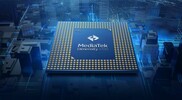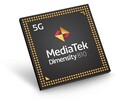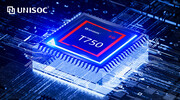MediaTek Dimensity 8020 vs MediaTek Dimensity 810 vs UNISOC T750
MediaTek Dimensity 8020
► remove from comparison
Der MediaTek Dimensity 8020 ist ein ARM-basiertes SoC (System-on-a-Chip), welches bei TSMC im 6-nm-Prozess gefertigt wird. Es wurde speziell für den Einsatz in Android-Smartphones entworfen und sortiert sich leistungstechnisch in die Mittelklasse ein. Es unterstützt alle aktuellen Mobilfunkstandards, inklusive 5G mit 2CC-CA (200MHz) und FDD+TDD.
Technisch ist der Dimensity 8020 ähnlich zum älteren Dimensity 1100.
Die CPU arbeitet insgesamt mit acht Kernen, welche sich in zwei Cluster unterteilen. Der eine besitzt vier ARM Cortex-A78-Leistungskerne mit jeweils bis zu 2,6 GHz, der andere vier ARM Cortex-A55-Energiesparkerne mit jeweils bis zu 2,0 GHz. Als Arbeitsspeicher kann LPDDR4-RAM verwendet werden, als interner Speicher wird UFS 3.1 unterstützt.
In puncto Konnektivität steht Dual-5G zur Verfügung, außerdem Wi-Fi 6 und Bluetooth 5.2.
Die integrierte Grafikeinheit ARM Mali-G77 MC9 kann Displays mit einer Auflösung von bis zu 2.560 x 1.080 und einer Bildwiederholrate von bis zu 144 Hz befeuern (ev. nur bei Full HD+).
Der Chip wird im aktuellen 6nm Prozess (Mid-Range) bei TSMC hergestellt.
MediaTek Dimensity 810
► remove from comparison
Der MediaTek Dimensity 810 (MT6833P) ist ein ARM-basiertes SoC (System-on-a-Chip), welches bei TSMC im 6-nm-Prozess gefertigt wird. Es wurde speziell für den Einsatz in Android-Smartphones entworfen und sortiert sich leistungstechnisch in die untere Mittelklasse ein. Es unterstützt alle aktuellen Mobilfunkstandards, inklusive 5G-Sub6.
Die CPU arbeitet insgesamt mit acht Kernen, welche sich in zwei Cluster unterteilen. Der eine besitzt zwei ARM Cortex-A76-Leistungskerne mit jeweils bis zu 2,4 GHz, der andere sechs ARM Cortex-A55-Energiesparkerne mit jeweils bis zu 2,0 GHz. Als Arbeitsspeicher kann LPDDR4x-RAM mit 2.133 MHz verwendet werden, als interner Speicher wird UFS 2.2 unterstützt.
In puncto Konnektivität stehen Dual-5G (Sub6) mit einer theoretischen Spitzen-Download-Geschwindigkeit von bis zu 2,77 GBit/s zur Verfügung, außerdem Wi-Fi 5 und Bluetooth 5.1.
Die integrierte Grafikeinheit ARM Mali-G57 MP2 kann Displays mit einer Auflösung von bis zu 2.520 x 1.080 Pixeln (Full HD+) und einer Bildwiederholrate von bis zu 120 Hz befeuern.
UNISOC T750
► remove from comparison
Der UniSoc T750 (früher auch Tanggula) ist ein Mittelklasse-SoC mit 8 Prozessorkernen in zwei Clustern. Die zwei großen ARM Cortex-A76-Kerne werden mit bis zu 2 GHz getaktet. Zum Stromsparen sind 6 kleine ARM ARM Cortex-A55-Kerne mit 1.8 GHz integriert. Der schnellere UniSoc T760 bietet im Vergleich vier große A76 Kerne und unterstützt schnelleren Hauptspeicher.
Der integrierte Speicherkontroller unterstützt LPDDR4X mit bis zu 1866 MHz. Der integrierte ISP unterstützt zwei Hauptkameras (eine bis zu 64 MPixel). Als integrierte Grafikkarte kommt eine ARM Mali-G57 MC2 (2 Kerne) mit bis zu 680 MHz zum Einsatz. Weiters integriert der SoC noch 802.11ac (Wi-Fi 5), Bluetooth. 5.0, FM-Radio, GPS / Glonass / Baeidou / Galileo und 5G (TDD+FDD CA Sub-6Ghz) / LTE (Cat15 DL, Cat18 UL).
Der Chip wird im aktuellen 6nm Prozess gefertigt und sollte eine gute Stromeffizienz aufweisen.
| Model | MediaTek Dimensity 8020 | MediaTek Dimensity 810 | UNISOC T750 | ||||||||||||||||||||||||||||||||||||||||||||||||||||||||||||||||||||||||||||||||||||||||||||||||||||||||||||||||||||||||||||||||||||||||||||||||||||||||||||||||||||
| Series | Mediatek | Mediatek | UNISOC | ||||||||||||||||||||||||||||||||||||||||||||||||||||||||||||||||||||||||||||||||||||||||||||||||||||||||||||||||||||||||||||||||||||||||||||||||||||||||||||||||||||
| Codename | Cortex-A78 / A55 | Cortex-A76 / A55 | Cortex-A76 / A55 | ||||||||||||||||||||||||||||||||||||||||||||||||||||||||||||||||||||||||||||||||||||||||||||||||||||||||||||||||||||||||||||||||||||||||||||||||||||||||||||||||||||
| Serie: Cortex-A76 / A55 |
|
|
| ||||||||||||||||||||||||||||||||||||||||||||||||||||||||||||||||||||||||||||||||||||||||||||||||||||||||||||||||||||||||||||||||||||||||||||||||||||||||||||||||||||
| Clock | 2000 - 2600 MHz | 2000 - 2400 MHz | 1800 - 2000 MHz | ||||||||||||||||||||||||||||||||||||||||||||||||||||||||||||||||||||||||||||||||||||||||||||||||||||||||||||||||||||||||||||||||||||||||||||||||||||||||||||||||||||
| Cores / Threads | 8 / 8 4 x 2.6 GHz ARM Cortex-A77 4 x 2.0 GHz ARM Cortex-A55 | 8 / 8 | 8 / 8 2 x 2.0 GHz ARM Cortex-A76 6 x 1.8 GHz ARM Cortex-A55 | ||||||||||||||||||||||||||||||||||||||||||||||||||||||||||||||||||||||||||||||||||||||||||||||||||||||||||||||||||||||||||||||||||||||||||||||||||||||||||||||||||||
| Technology | 6 nm | 6 nm | 6 nm | ||||||||||||||||||||||||||||||||||||||||||||||||||||||||||||||||||||||||||||||||||||||||||||||||||||||||||||||||||||||||||||||||||||||||||||||||||||||||||||||||||||
| Features | 4x ARM Cortex-A77 (2.6 GHz), 4x ARM Cortex-A55 (2 GHz), ARM Mali-G77 MP9, APU 570, 5G Modem, MiraVision HDR10+, Wi-Fi 6, Bluetooth 5.2, UFS 3.1, LPDDR4x | 2x ARM Cortex-A76 (2.4 GHz), 6x ARM Cortex-A55 (2 GHz), ARM Mali-G57 MP2, Wi-Fi 5, Bluetooth 5.1, UFS 2.2, LPDDR4x Support; SA & NSA modes; SA Option2, NSA Option3 / 3a / 3x, NR TDD Band, NR FDD Band, DSS, NR DL 2CC, 120 MHz bandwidth, 256QAM NR UL 2CC, | 5G, LTE, ISP (up to 64MPixel), eMMC 5.1, UFS 3.1, LPDDR4X 1866MHz, LTE, GPS, Glonass, Beidou, Galileo, 802.11 b/g/n/ac, Bloetooth 5.0, FM-Radio, TEE Security | ||||||||||||||||||||||||||||||||||||||||||||||||||||||||||||||||||||||||||||||||||||||||||||||||||||||||||||||||||||||||||||||||||||||||||||||||||||||||||||||||||||
| iGPU | ARM Mali-G77 MP9 | ARM Mali-G57 MP2 ( - 1068 MHz) | ARM Mali-G57 MP2 ( - 680 MHz) | ||||||||||||||||||||||||||||||||||||||||||||||||||||||||||||||||||||||||||||||||||||||||||||||||||||||||||||||||||||||||||||||||||||||||||||||||||||||||||||||||||||
| Architecture | ARM | ARM | ARM | ||||||||||||||||||||||||||||||||||||||||||||||||||||||||||||||||||||||||||||||||||||||||||||||||||||||||||||||||||||||||||||||||||||||||||||||||||||||||||||||||||||
| Announced | |||||||||||||||||||||||||||||||||||||||||||||||||||||||||||||||||||||||||||||||||||||||||||||||||||||||||||||||||||||||||||||||||||||||||||||||||||||||||||||||||||||||
| Manufacturer | www.mediatek.com | www.mediatek.com | |||||||||||||||||||||||||||||||||||||||||||||||||||||||||||||||||||||||||||||||||||||||||||||||||||||||||||||||||||||||||||||||||||||||||||||||||||||||||||||||||||||
| L3 Cache | 3 MB |


 Deutsch
Deutsch English
English Español
Español Français
Français Italiano
Italiano Nederlands
Nederlands Polski
Polski Português
Português Русский
Русский Türkçe
Türkçe Svenska
Svenska Chinese
Chinese Magyar
Magyar